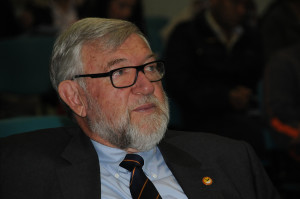Wolf Grabendorff – Obama`s Latin American Excursion: Coping with the past and praising the future
President Obama had few choices where to go in his probably last visit to Latin America, though a quick trip to Colombia, if and when the peace agreement will finally be signed, could still be in the cards. Most countries in the region had to be excluded from any politically successful itinerary because of internal turmoil or the lack of international projection of a visit there. The final choice of combining Cuba and Argentina did make sense in the context of intending “historical visits”. Both countries, entirely distinct in political culture and international importance, had at least two things in common: A long period of very difficult bilateral relations with the United States due to quite different internal development models and external world views. This complex historical experience allowed Obama an unique effort in coping with the past not only with graceful gestures but also with an astonishing amount of self-criticism in the name of the US, inconceivable in the case of his hosts Raul Castro or Mauricio Macri. This form of trying to establish a new form of relations with these two countries seems to reflect more the intellectual ability and the personal style of Obama than a real change in US foreign policy.
Both countries also are attempting, more or less at the same time, to reorder their internal development strategies as well as their economic alliances. Obama was therefore not at all shy to recommend some of the traditional recipes the US is well known for: More room for private enterprise and less state involvement in the economy, more foreign investment and less “excessive” social spending, more democratic participation of the civil society and less state control of the public space, but more efforts in reestablishing public security and more cooperation and commitment in the fight against organized crime and terrorism.
There can be no doubt that all of the above is very much in the interest and to the benefit of the United States and mostly also for some of economic and political elites in the countries visited, whose efforts to apply these recipes in the immediate future Obama praised effusively. Unfortunately most of these normative guidelines have been adopted at some point in the recent history of both countries and their negative impact upon major parts of the population had not only led to social upheaval and political instability but also to one of Latin Americans major revolutions.
If this willingness to return to past practices of systemic nature in the relations of Cuba and Argentina with the United States, with the declared intention of better facing the challenges of globalization, really could represent a kind of “normalization” in the Western Hemisphere seems doubtful, even though it reflects a different “soft power “ approach by the traditional regional hegemon. The strategy of the Obama Administration to induce change by approximation reflects the increasing lack of other options for maintaining support from the countries of the former “backyard” and the need to face competition mainly from China but also from Russia in the region. Even though this strategy seems to be welcomed by the two countries visited, doubts remain about the effects of this renewed linkage by important segments of the population in both of the countries.
The reform efforts in Cuba and Argentina will certainly not only be keenly observed by the United States but also by their neighbors and regional partners, who themselves have embraced these recommendations from Washington at times in one form or another and often had to suffer long term economic and social consequences directly related to these highly inadequate measures for their own societies. How long the legacy of Obama´s return to Latin America and the legitimacy of the intended new role of the US as a good neighbor will last, will depend primarily upon the distribution of the future benefits of the reforms , if they come to bear the results promised, within Cuba and within Argentina.
Continue Reading our Special Dossier: Obama in Cuba and Argentina

